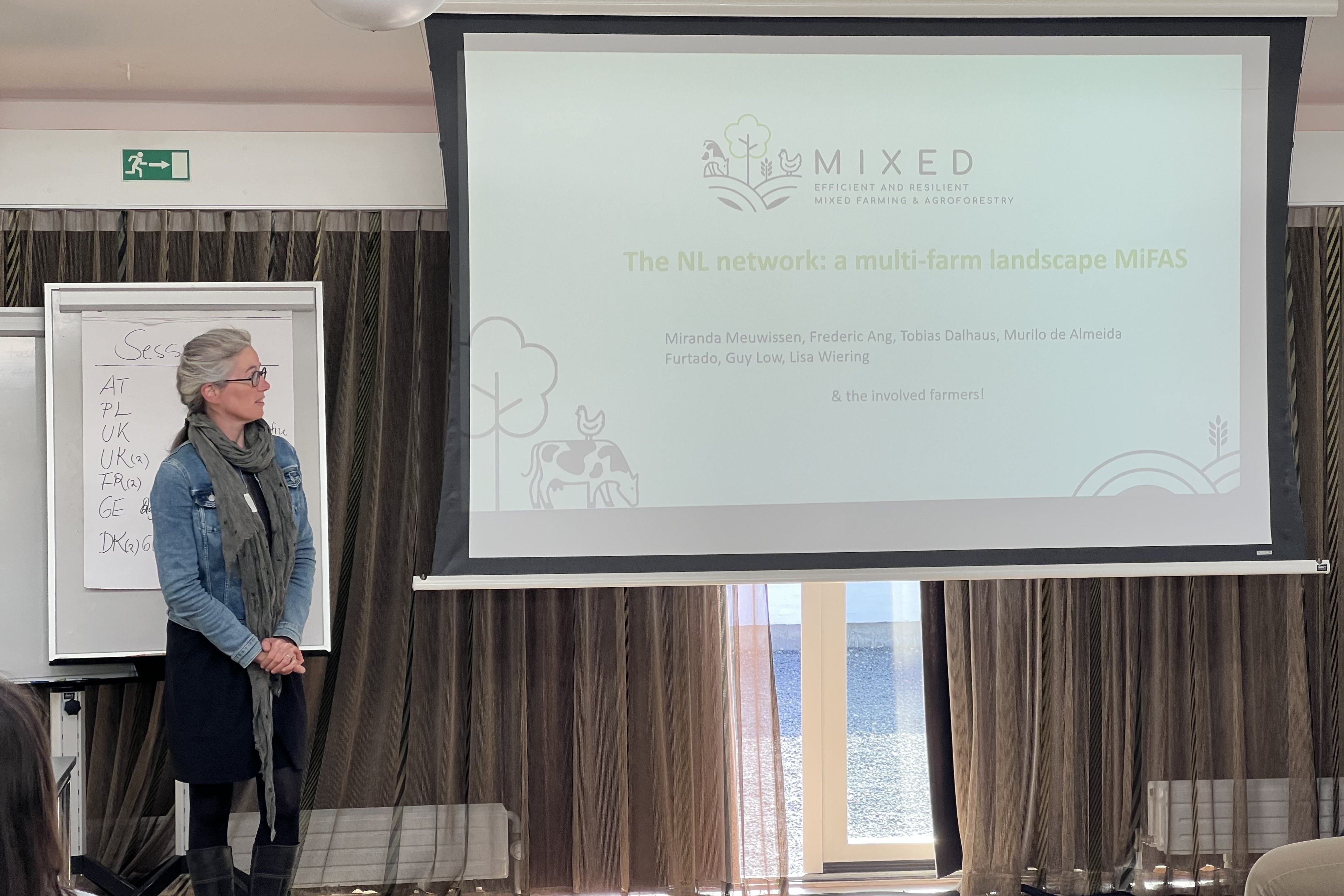MIXED project meeting in Denmark
The first face to face meeting in the MIXED project was a huge success. At the end of April, 50 international participants in the H2020 MIXED project met in Denmark - for the first time face-to-face - to discuss mixed farming systems (incl. agroforestry) in Europe.





The MIXED project is a multi-actor research and development project that involves both researchers, farmers’ organisations and practitioners (farmers). Due to the COVID situation the MIXED project team had only met online until this meeting.
On the first day of the meeting the research approaches and progress of MIXED was presented by the different research teams investigating challenges, benefits and trade offs related to transformation of more specialized systems to mixed farming and agroforestry systems. In spite of the COVID restrictions that have affected the project from its very beginning, there was progress at all levels and across all teams.
Innovative farmers venture into agroforestry
After an intensive afternoon the participants were invited to visit the organic farm, Sommerbjerg, where MIXED met the owner Mads Helms and his colleague Gert Glob Lassen from the organic farm Ellinglund Økologi. They are both innovative dairy farmers who have ventured into agroforesty in relation to an agroforestry project, ROBUST, lead by the Innovation Centre of Organic Farming – one of the Danish MIXED partners. At Sommerbjerg the trees were planted in rows in 2019 and intercropped with cereal and grass. In due time, when the trees are larger and more robust, the cattle will graze between the trees. Till then branches and leaves can be used for fodder for the cattle. Mads Helms explained: "the driver for us to plant trees is a desire to reduce the climate impact of our food production through carbon sequestration". In addition the trees will also reduce nitrogen leaching from the field. The organic dairy, Them Dairy, is also part of the ROBUST project - the aim is to develop and brand an ‘agroforesty cheese’ when the dairy cattle will start grazing in the area. As a special treat concluding the visit, there were tastings of several of the well-known cheeses from Them Dairy.
What goes on at the farm level?
On the second day of the event 14 networks of farmers from 10 countries presented their ways of practicing mixed farming and agroforestry, as well as what challenges they face in the different systems and countries. The challenges of the networks are very different, but common to them is that they are very interested in guidelines from the MIXED project in the form of practical and technical recommendations. Vice versa, the researchers in MIXED received invaluable knowledge from the networks in relation to the further research in the project.
Speed dating workshop
The following day the 10 national teams (researchers and practitioners) met for a “speed dating workshop”, where the purpose was to learn more about each other and exchange experiences.
Poplar Pigs were very popular
After the speed dating workshop the whole MIXED team went by bus to "Klimafonden"(the Climate foundation) and the GreenLab in Skive to challenge the ‘mixed’ concept in relation to use of slurry from farms and grass biomass for example in the production of local green energy and potentially fodder for non-ruminants. Next stop of the trip was at "Hestbjerg Økologi", where the participants learned about the organic pig farm with outdoor sows and piglets in an agroforestry system with Poplar trees – and enjoyed the view of piglets running around and seemingly enjoying their natural environment. Marianne Fløe Hestbjerg explained that she and her husband Bertel Hestbjerg, who runs the farm, work everyday to improve the animal welfare of their organic pigs.
Robin Walker who is a part of the national team in the United Kingdom was happy with the MIXED meeting in Billund, Denmark:
“It was great to meet many of the MIXED partners in person here in Denmark - it provided the perfect opportunity to talk about the project and exchange thoughts and ideas on a wide range of approaches to mixed farming systems and associated industries. So many interesting activities are taking place in the MIXED project amongst the various partners, and the field visits this week, shows just how effective a well thought out and integrated approach to research and development can lead to positive actions on the ground - this was in full view for all to see during the industry visits around the GreenLab complex as well as at the ‘Poplar Pigs from Herstbjerg’ farm enterprise. The trip also indicated a huge amount of enthusiasm to try and stimulate a series of study tours linking the networks from different countries, especially those showing some broad similarities in approach, in order to cross fertilise ideas and experiences amongst those involved.”
The field trip ended at the Nørre Vosborg Estate in Vemp where the meeting was concluded with a social dinner.
